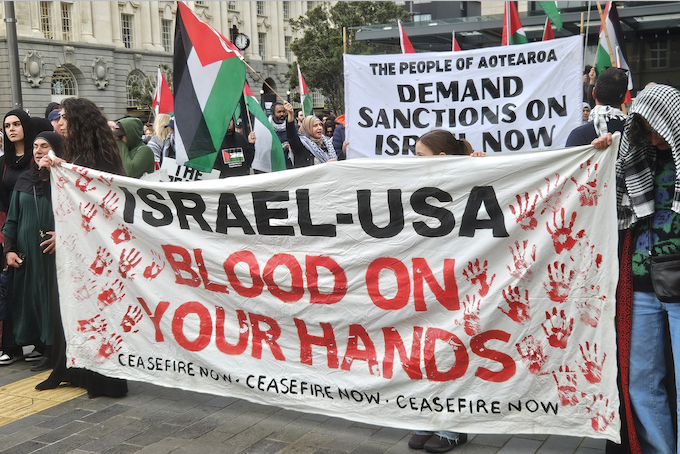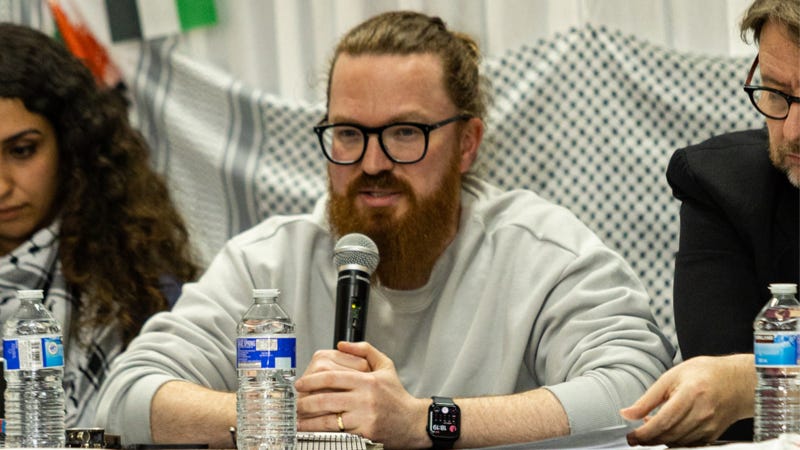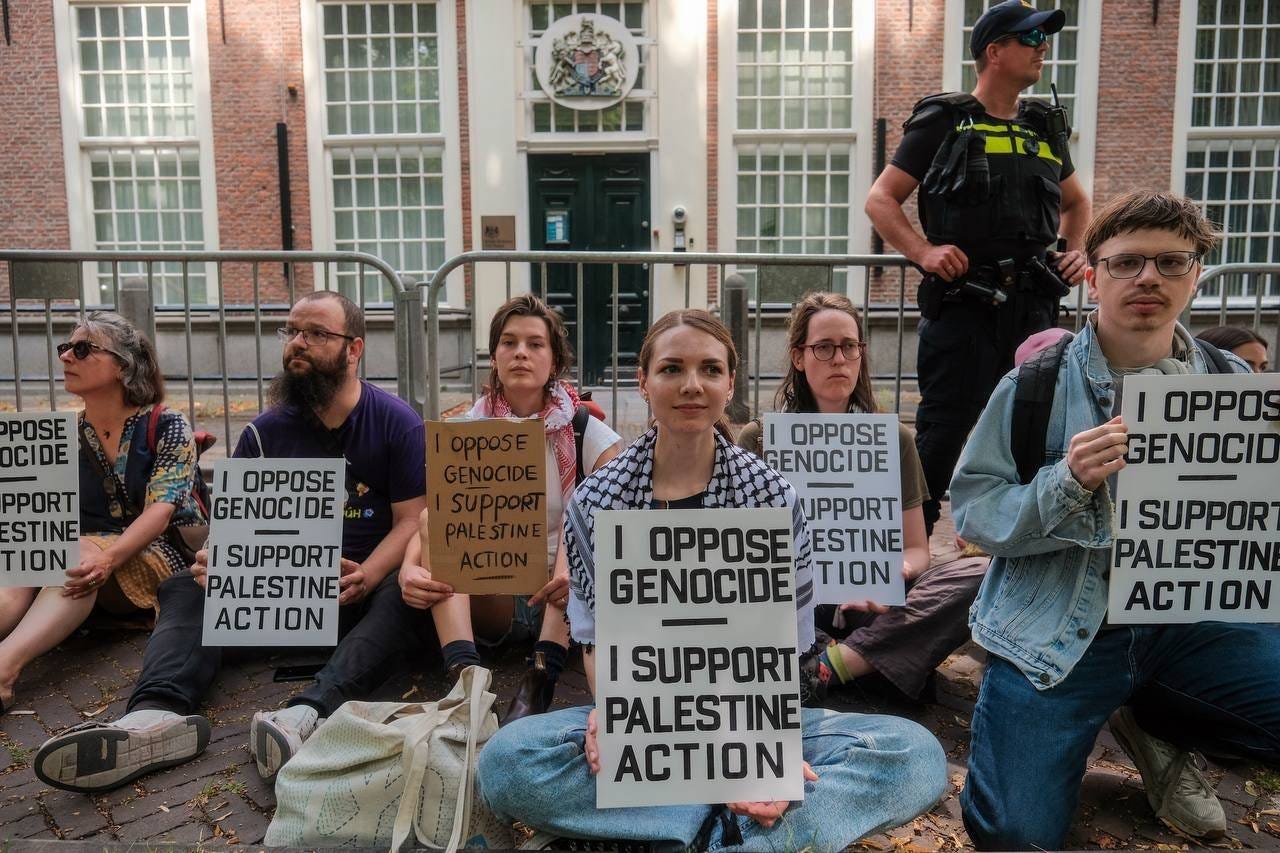
SPECIAL REPORT: By Mick Hall
A leaked document has revealed secretive plans to revise terror laws in New Zealand so that people can be charged over statements deemed to constitute material support for a proscribed organisation.
It shows the government also wants to widen the criteria for proscribing organisations to include groups that are judged to “facilitate” or “promote and encourage” terrorist acts.
The changes would see the South Pacific nation falling in line with increasingly repressive Western countries like the UK, where scores of independent journalists and anti-genocide protesters have been arrested and charged under terrorism laws in recent months.
- READ MORE: Proscribed terrorism groups in UK
- UK crackdown on dissent
- Banning Palestine Action: How the UK government is silencing dissent
- France will recognise State of Palestine, Macron says
- Other Israeli war on Gaza reports
The consultation document, handed over to the New Zealand Council for Civil Liberties (NZCCL), reveals the government has been in contact with a small number of unnamed groups this year over plans to legally redefine what material support involves, so that public statements or gestures involving insignia like flags can lead to charges if construed as support for proscribed groups.
As part of a proposal to revise the Terrorism Suppression Act, the document suggests the process for designating organisations as terror groups should be changed by “expanding the threshold to enable more modern types of entities to be designated, such as those that ‘facilitate’ or ‘promote and encourage’ terrorist acts”.
The Ministry of Justice has been contacted in an attempt to ascertain which groups it has been consulting with and why it believed the changes were necessary.
NZCCL chairman Thomas Beagle told Mick Hall In Context his group was concerned the proposed changes were a further attempt to limit the rights of New Zealanders to engage in political protest.
‘What’s going on?’
“When you look at the proposal to expand the Terrorism Suppression Act, alongside the Police and IPCA conspiring to propose a law change to ban political protest without government permission, you really have to wonder what’s going on,” he said.
A report by the Independent Police Conduct Authority (IPCA) in February proposed to give police the right to ban protests if they believed there was a high chance of public disorder and threats to public safety.
That would potentially mean bans on Palestinian solidarity protests if far right counter protestErs posed a threat of violent confrontation.
The stand-alone legislation would put New Zealand in line with other Five Eyes and NATO-aligned security jurisdictions such as Australia, the United Kingdom, and Canada.
Beagle points out proposed changes to terror laws would suppress freedom of speech and further undermine freedom of assembly and the right to protest.
“We’ve seen what’s happening with the state’s abuse of terrorism suppression laws in the UK and are horrified that they have sunk so far and so quickly,” he said.
More than 100 people were arrested across the UK on suspicion of supporting Palestine Action, a non-violent protest group proscribed as a terrorist organisation by the British government earlier this month.
Arrests in social media clips
Social media clips showed pensioners aggressively arrested while attending rallies in Liverpool, London, Manchester, Edinburgh, Bristol and Truro over the weekend.
Independent journalists and academics have also faced state repression under the UK’s Terrorism Act.
Among those targeted was Electronic Intifada journalist Asa Winstanley, who had his home raided and devices seized in October last year as part of the opaque counter-terror drive “Operation Incessantness”.

In May, the country’s Central Criminal Court ruled the raid was unlawful.
Journalist Richard Medhurst has had a terror investigation hanging over his head since being detained at Heathrow Airport in August last year and charged under section 8 of the Terrorism Act. Activist and independent journalist Sarah Wilkinson had her house raided in the same month.
Others have faced similar intimidation and threats of jail. In November 2024, Jewish academic Haim Bresheeth was charged after police alleged he had expressed support for a “proscribed organisation” during a speech outside the London residence of the Israeli ambassador to the UK.
Meanwhile, dozens of members of Palestine Action are in jail facing terror charges. The vast majority are being held on remand where they may wait two years before going to trial — a common state tactic to take activists off the street and incarcerate them, knowing the chances of conviction are slim when they eventually go to court.
‘Targeted amendments’
The document says the New Zealand government wants to progress “targeted amendments” to the Act, creating or amending offences “to capture contemporary behaviours and activities of concern” like “public expressions of support for a terrorist act or designated entities, for example by showing insignia or distributing propaganda or instructional material.”

It proposes to improve “the timeliness of the process, by considering changes to who the decision-maker is” and extending the renewal period from three to five years.
The document suggests consulting the Attorney-General over designation-related decisions to ensure legal requirements are met may not be required and questions whether the designation process requiring the Prime Minister to review decisions twice is necessary. It asks whether others, like the Foreign Minister, should be involved in the decision-making process.
Beagle believes the secretive proposals pose a threat to New Zealand’s liberal democracy.
“Political protest is an important part of New Zealand’s history,” he said.
“Whether it’s the environment, worker’s rights, feminism, Māori issues, homosexual law reform or any number of other issues, political protest has had a big part in forming what Aotearoa New Zealand is today.
Protected under Bill of Rights
“It’s a right protected by New Zealand’s Bill of Rights and is a critical part of being a functioning democracy.”
The terror laws revision forms part of a wider trend of legislating to close down dissent over New Zealand’s foreign policy, now closely aligned with NATO and US interests.
The government is also widening the definition of foreign interference in a way that could see people who “should have known” that they were being used by a foreign state to undermine New Zealand’s interests prosecuted.
The Crimes (Countering Foreign Interference) Amendment Bill, which passed its first reading in Parliament on November 19, would criminalise the act of foreign interference, while also increasing powers of unwarranted searches by authorities.
The Bill is effectively a reintroduction of the country’s old colonial sedition laws inherited from Britain, the broadness of the law having allowed it to be used against communists, trade unionists and indigenous rights activists.
Republished from Mick Hall in Context on Substack with permisson.













































